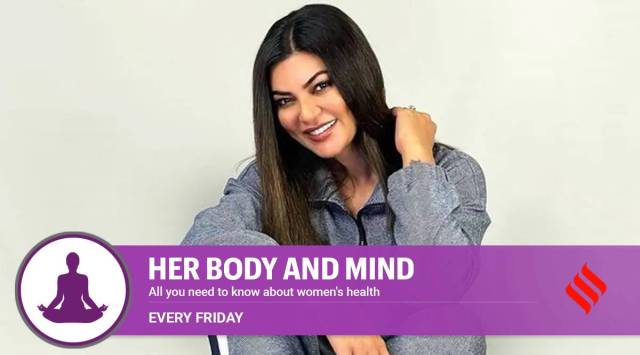Why Sushmita Sen’s heart attack should be a warning for younger women? What are the triggers they should know about?
Excessive smoking, vaping and stress and strain among working women stimulate production of adrenaline and cortisol, which result in inflammation of arteries, plaques and clotting. These can lead to an unstable angina, heart attack and sudden cardiac arrest no matter how fit you claim to be, say top cardiologists
 Sushmita Sen opened up about suffering a heart attack recently. (Photo: Sushmita Sen/Instagram)
Sushmita Sen opened up about suffering a heart attack recently. (Photo: Sushmita Sen/Instagram) When Sushmita Sen, 47, tweeted that she had had an angioplasty and a stent in her heart, many of us were left wondering how an icon of fitness, who set new goals with her workouts and yoga sessions, could get a heart attack so young. Her story shows how heart attacks in younger women are now challenging the traditional theory that they are protected in their reproductive years because of the naturally shielding effect of female hormones like oestrogen.
“Ten years ago, if a woman in the reproductive age complained of chest pain, we would seldom consider it as a heart attack at the word go. Now with younger women, as young as 35, reporting heart episodes, we do not take a chance and assess cardiac health on priority,” says Dr TS Kler, Chairman, Fortis Heart and Vascular Institute, Fortis Memorial Research Institute, Gurugram. So, what’s raising their risk of heart disease if their oestrogen is protecting them? “Clearly, the rising incidence of diabetes and obesity in younger people and smoking are the biggest risk factors for heart disease. This deadly combination makes younger women more prone to developing blockages in their arteries. Smoking among younger women, particularly in urban centres, has increased and has become habitual. Smoking tobacco sharply reduces HDL or good cholesterol in women,” he explains.
“That era has gone when people said God protects women in matters of the heart. There has been a socio-cultural change in India. Please understand that younger girls are exposed to more severe stress than say two decades ago. They are internalising stress resulting from exacting work schedules, same as that of men, and also balancing chores and duties at home, where they rarely have much support in task-sharing. Women are expected to be emotionally available for everybody. No matter how fit you are physically, if that doesn’t integrate with other factors, then you are at risk. Stress and strain stimulate production of adrenaline and cortisol, which result in inflammation of arteries and formation of atherosclerotic plaque and thrombus or blood clots. These can lead to an unstable angina, heart attack and sudden cardiac arrest. Then there is an increased incidence of smoking, which is often uncontrolled and stress-induced among the younger age group. We must also consider the fact that more and more younger women are consuming oral hormonal pills to prevent pregnancy, which impact the heart. Studies have shown how hormones in birth control pills can raise your blood pressure if you are hypertensive. Most women do not get their BP checked before they start popping the pills. These often change the blood fats. For example, levels of HDL could go down while those of LDL and triglycerides could go up. Exposure to atmospheric pollutants is quite damaging too,” says Dr Lekha Pathak, HOD, Cardiology, Nanavati Max Super Speciality Hospital, Mumbai.
“Diabetes in itself increases one’s risk of heart attacks by two to four times. Generally diabetes is also associated with obesity, hypertension and deranged lipid levels which together increase the risk of heart attacks significantly. People are also underestimating the role of hypertension. According to a recent study, the prevalence of hypertension in Indians less than 30 years of age is said to be 11.2 per cent. Hypertension leads to thickening of your arteries and increased load on the heart, which, in the long-term, increase the risk of heart attacks,” says Dr Mohit Tandon, Consultant Non Invasive Cardiologist, Fortis Escorts Hospital, Okhla, New Delhi.
“Smoking and vaping have emerged as one of the strongest risk factors in increasing the incidence of heart attacks in the younger demographic, be it men and women. If you smoke one pack of cigarettes per day, it can more than double the risk of you having a heart attack. And if you think vaping is less harmful, you will be astonished to know that vaping can increase the risk of heart attacks by 34 per cent. E cigarettes contain nicotine which increases heart rate and BP,” adds Dr Tandon. “Then there is substance abuse which increases the risk of heart-related deaths in the young due to decreased blood supply to the heart or arrhythmias. These continue to be stressors even if you have a regulated fitness routine,” he says.
POST-MENOPAUSAL RISK
According to Doctor Kler, “After menopause, women catch up with men very fast and are just as much at risk, reporting high levels of cholesterol and triglycerides. Not only that, mortality from a heart event is higher in women than men.”
WHAT SIGNS SHOULD WOMEN BE WARY OF?
Dr Kler feels heart attacks in women often do not get diagnosed at the right time because symptoms are atypical and confusing and are more likely to be missed by doctors. “They may report dull discomfort in the tummy, nausea, anxiety (this is mostly misread), a little pain in the jaw, some fatigue and dizziness. Sometimes women also tend to overlook heart attack symptoms as some minor issue.”
WHAT TESTS SHOULD WOMEN UNDERTAKE?
Given their increased risk compared to men, women need to go for a battery of tests should they complain of what might look like heart attack symptoms. “Let me clarify here that women have a higher chance of having a false positive TMT result, which means they could be subjected to more invasive tests and angiography. I would say a stress echo is more reliable for women than a simple TMT,” adds Dr Kler.
HEART ATTACKS AMONG YOUNG PEOPLE
“Overall, there has been a 54 per cent increase in the rate of death related to heart attacks in India. In 2021, 70 per cent of heart attack deaths occurred in the 30 to 60 year age group. Data shows that between 2000 to 2016, the heart attack rates increased by two per cent every year for those between 20 to 30 years,” says Dr Tandon.



- 01
- 02
- 03
- 04
- 05




























